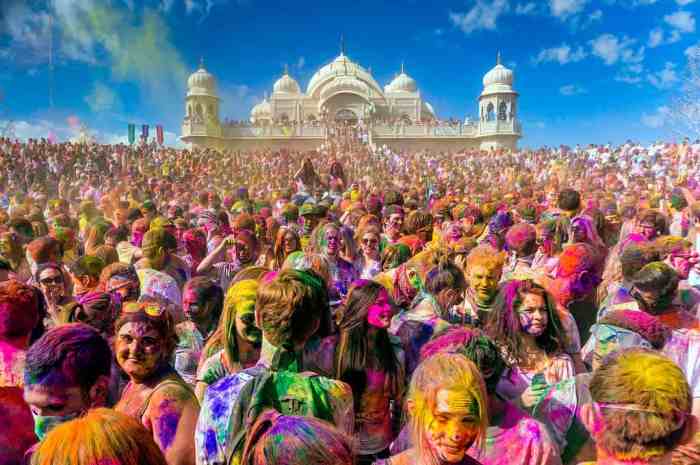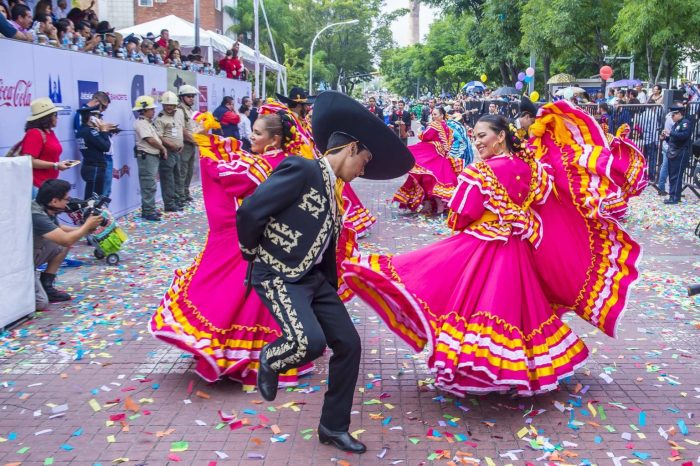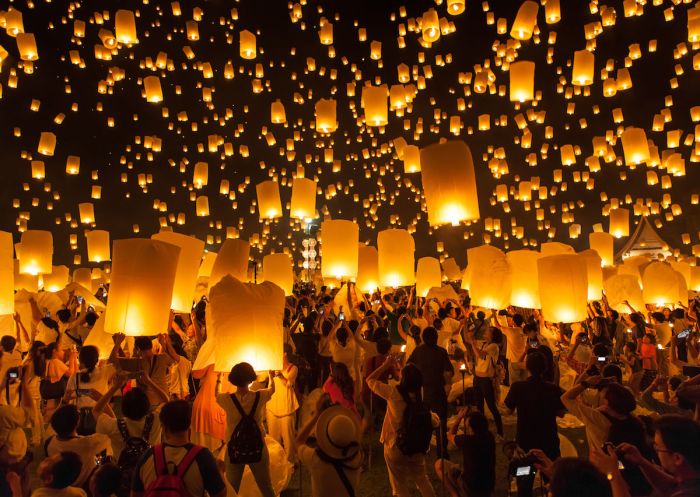Best cultural festivals worldwide sets the stage for this enthralling narrative, offering readers a glimpse into a story that is rich in detail and brimming with originality from the outset. This comprehensive exploration delves into the vibrant tapestry of cultures showcased through these extraordinary events, highlighting their profound impact on our world.
From the bustling streets of Rio de Janeiro during Carnival to the serene temples of Kyoto during Gion Matsuri, cultural festivals ignite a sense of wonder and connection. They serve as a testament to the enduring power of tradition, fostering a deep appreciation for diverse customs and beliefs.
Cultural Diversity and Inclusivity

Cultural festivals worldwide showcase the rich tapestry of human creativity and expression. They celebrate unique traditions, customs, and art forms, fostering a spirit of cultural exchange and understanding.
Range of Cultures Represented
Festivals span the globe, representing diverse cultural backgrounds and traditions. From the vibrant Holi festival in India to the intricate Dragon Boat Festival in China, each celebration offers a glimpse into the heritage and identity of a particular culture.
Examples of Unique Festivals
- Carnival in Rio de Janeiro, Brazil: A vibrant celebration known for its elaborate costumes, samba music, and street parties.
- Day of the Dead in Mexico: A unique festival that honors deceased loved ones through colorful altars, parades, and offerings.
- Songkran in Thailand: A traditional New Year’s festival that involves water splashing and merit-making.
Promoting Cultural Exchange and Understanding
Cultural festivals provide opportunities for people from different backgrounds to interact and learn about each other’s traditions. Through music, dance, food, and art, these events foster a sense of global community and break down barriers of prejudice and misunderstanding.
Economic Impact

Cultural festivals offer significant economic benefits, boosting tourism, creating employment opportunities, and generating revenue for local communities.
According to the World Tourism Organization, cultural tourism accounts for over 40% of global tourism revenue. Festivals attract tourists from near and far, leading to increased hotel bookings, restaurant visits, and spending on local transportation and souvenirs.
To experience the vibrant tapestry of cultures worldwide, explore the best cultural festivals. From the bustling streets of Rio de Janeiro during Carnival to the ancient rituals of the Thaipusam festival in Malaysia, these celebrations offer a glimpse into diverse traditions.
For an unforgettable travel adventure in 2024, consider destinations like best travel destinations 2024 , where you can immerse yourself in these vibrant cultural experiences and create memories that will last a lifetime.
Tourism
- Increased hotel occupancy and tourism revenue
- Promotion of local attractions and cultural heritage
- Creation of jobs in the tourism and hospitality sectors
Employment
- Direct employment for event organizers, performers, and vendors
- Indirect employment in supporting industries such as catering, transportation, and security
- Opportunities for local artisans and entrepreneurs to showcase and sell their products
Revenue Generation
- Ticket sales and merchandise revenue
- Sponsorship and advertising opportunities
- Increased tax revenue from tourism-related spending
Cultural festivals play a vital role in supporting local businesses and artisans. They provide a platform for local entrepreneurs to reach a wider audience, promote their products, and generate income. Festivals also create a sense of community pride and foster cultural preservation and appreciation.
Soak up the vibrant colors, captivating rhythms, and unique traditions of the world’s best cultural festivals. Afterward, unwind and rejuvenate at family-friendly resorts that offer a perfect balance of relaxation and adventure. These resorts cater to families of all ages, providing a memorable and enriching vacation experience while still immersing you in the cultural tapestry of your destination.
As you return to the festival grounds, continue to embrace the kaleidoscope of cultures, making memories that will last a lifetime.
Social and Community Impact: Best Cultural Festivals Worldwide
Cultural festivals offer numerous social and community benefits, fostering a sense of belonging, unity, and cultural preservation.
One significant impact is the creation of a shared space where individuals from diverse backgrounds come together. Festivals provide a platform for people to connect, interact, and celebrate their shared heritage. By promoting inclusivity and embracing differences, festivals help break down barriers and build bridges between communities.
Fostering a Sense of Belonging and Unity
Many cultural festivals are designed to celebrate specific cultural traditions, showcasing unique customs, music, dance, and art forms. These events allow participants to feel a deep sense of connection to their roots and cultural identity. By immersing themselves in their heritage, individuals gain a stronger sense of belonging and pride in their community.
Cultural Preservation and Revitalization
Cultural festivals play a crucial role in preserving and revitalizing cultural traditions. They provide a stage for traditional arts and crafts to be showcased, ensuring that these practices are passed down to future generations. Festivals also encourage the transmission of oral histories, legends, and stories, preserving the collective memory of a community. By keeping traditions alive, festivals help maintain cultural diversity and prevent cultural erosion.
Historical Significance
Cultural festivals have been an integral part of human civilization for centuries, providing a platform to celebrate and preserve cultural heritage.
The origins of cultural festivals can be traced back to ancient times, when communities gathered to mark significant events, such as the harvest, the changing of seasons, or religious holidays. These festivals served as a way to honor traditions, strengthen community bonds, and pass down cultural knowledge to future generations.
Major Festivals Worldwide
Throughout history, numerous major cultural festivals have emerged, each with its own unique origins and traditions:
– Diwali (India): A five-day festival of lights, symbolizing the victory of good over evil and the triumph of light over darkness.
– Carnival (Brazil): A week-long celebration before Lent, featuring vibrant parades, samba music, and elaborate costumes.
– Songkran (Thailand): A three-day water festival marking the Thai New Year, where people engage in water fights and purification rituals.
– Oktoberfest (Germany): A 16-day beer festival held in Munich, featuring traditional Bavarian food, music, and costumes.
– Day of the Dead (Mexico): A two-day festival honoring the deceased, where families gather to remember their loved ones with food, music, and altars.
These festivals have evolved over time, incorporating new elements and traditions while preserving their core cultural and religious significance.
Cultural and Religious Significance
Cultural festivals play a vital role in preserving and transmitting cultural identity. They provide a space for communities to share their traditions, customs, and beliefs, fostering a sense of belonging and continuity.
Many festivals are deeply rooted in religious traditions, honoring deities, celebrating religious holidays, or commemorating historical events. These festivals serve as a way to connect with the divine, strengthen faith, and express religious devotion.
Through their historical significance, cultural festivals continue to connect people to their past, present, and future, preserving cultural heritage and fostering a sense of community and belonging.
Artistic Expression and Creativity

Cultural festivals provide a platform for artistic expression and creativity, showcasing a diverse range of performances, exhibitions, and workshops. These events offer opportunities for artists to share their unique perspectives, connect with audiences, and inspire cultural exchange.
Performances, Best cultural festivals worldwide
Festivals feature a variety of live performances, including music, dance, theater, and spoken word. These performances often draw inspiration from traditional cultural practices, showcasing the richness and diversity of global artistic traditions. By bringing together artists from different backgrounds, festivals promote cultural exchange and foster a sense of global community.
Exhibitions
Visual art exhibitions are a common feature at cultural festivals, displaying works from emerging and established artists. These exhibitions showcase a wide range of artistic styles, mediums, and themes, offering attendees a glimpse into the creative minds of contemporary artists.
Workshops
Many festivals offer workshops and educational programs that provide hands-on experiences in various art forms. These workshops allow participants to learn new skills, connect with artists, and gain a deeper understanding of different cultural practices. By fostering artistic engagement, festivals contribute to the preservation and transmission of cultural traditions.
Sustainability and Environmental Impact
Cultural festivals have a significant impact on the environment, both positive and negative. On the one hand, they can raise awareness of environmental issues, promote sustainable practices, and generate revenue for conservation efforts. On the other hand, they can also contribute to waste, pollution, and energy consumption.
Best Practices for Minimizing Waste and Promoting Eco-Friendly Practices
To minimize the environmental impact of cultural festivals, organizers can implement a variety of best practices, including:
– Waste Reduction: Encourage attendees to bring their own reusable water bottles and food containers. Provide recycling and composting bins throughout the festival grounds.
– Energy Conservation: Use energy-efficient lighting and sound systems. Consider using renewable energy sources, such as solar or wind power.
– Sustainable Materials: Use biodegradable or reusable materials for decorations, signage, and other festival materials. Avoid using single-use plastics and styrofoam.
– Transportation: Promote public transportation, carpooling, and biking to the festival. Provide shuttle services from nearby parking areas.
– Education and Awareness: Educate attendees about the environmental impact of the festival and encourage them to make sustainable choices.
Examples of Festivals that Prioritize Sustainability and Environmental Consciousness
Many cultural festivals around the world have adopted sustainable practices to reduce their environmental impact. Here are a few examples:
– Glastonbury Festival (UK): This iconic music festival has implemented a comprehensive sustainability program that includes waste reduction, energy conservation, and water management initiatives.
– Bonnaroo Music & Arts Festival (USA): This festival uses renewable energy sources, provides recycling and composting bins, and encourages attendees to bring their own reusable water bottles.
– Coachella Valley Music and Arts Festival (USA): This festival has partnered with environmental organizations to promote sustainability and reduce waste. They use solar energy, provide water refill stations, and encourage attendees to carpool or take public transportation.
By adopting sustainable practices, cultural festivals can minimize their environmental impact and promote a more responsible and eco-friendly approach to event planning.
Unique and Memorable Experiences
Cultural festivals offer attendees the opportunity to immerse themselves in diverse cultures and traditions, creating unique and unforgettable memories. From vibrant performances to captivating rituals, these festivals provide a glimpse into the world’s rich cultural heritage.
Planning to attend the world’s best cultural festivals? Get ready for an unforgettable experience! Remember to use a travel budget calculator to estimate expenses and ensure a smooth journey. With these tools, you can plan your cultural adventures effortlessly and make the most of your travels.
One attendee at the Rio Carnival in Brazil described the experience as “a whirlwind of color, music, and dance that left me in awe.” Another traveler who visited the Holi Festival in India spoke of the “joyful chaos and sense of community that made it an unforgettable experience.”
Must-See and Must-Do Activities
Cultural festivals worldwide offer a wide range of activities that cater to diverse interests. Some of the must-see or must-do experiences include:
- Attending traditional performances, such as dance, music, and theater.
- Participating in interactive workshops and demonstrations that showcase local crafts and traditions.
- Tasting authentic cuisine and sampling local delicacies.
- Exploring historical sites and monuments that provide a glimpse into the region’s past.
- Interacting with locals and learning about their customs and beliefs.
Tips for Planning an Unforgettable Experience
To make the most of a cultural festival experience, it’s essential to plan ahead. Here are a few tips:
- Research the festival in advance to understand its history, traditions, and activities.
- Purchase tickets or make reservations early, especially for popular festivals.
- Pack appropriate clothing and footwear for the festival’s environment and activities.
- Learn a few basic phrases in the local language to enhance interactions.
- Be open-minded and respectful of different cultures and traditions.
Global Recognition and Awards

Global recognition and awards serve as prestigious acknowledgements for cultural festivals that showcase exceptional artistry, innovation, and impact. These awards often come with substantial financial support, media attention, and industry validation, which can further elevate the festivals’ profiles and contribute to their sustainability.
The criteria for such awards vary depending on the organization bestowing them. Common factors considered include the festival’s artistic excellence, cultural authenticity, community engagement, economic impact, and environmental sustainability. Award-winning festivals often demonstrate a unique blend of tradition and innovation, fostering cultural exchange and promoting understanding among diverse audiences.
Award-Winning Festivals
Numerous cultural festivals worldwide have received global recognition and awards for their outstanding contributions. Here are a few notable examples:
- Edinburgh Fringe Festival (Scotland): Recognized as the world’s largest performing arts festival, it presents over 3,000 shows in various genres, including theater, comedy, dance, and music.
- Glastonbury Festival (England): Known for its eclectic music lineup and vibrant atmosphere, Glastonbury attracts over 200,000 attendees annually and has been recognized for its sustainability initiatives.
- Carnaval de Rio (Brazil): This iconic carnival is renowned for its elaborate parades, samba music, and vibrant costumes, attracting millions of visitors from around the globe.
- Diwali Festival of Lights (India): Celebrated worldwide, Diwali is a five-day festival of lights that symbolizes the triumph of good over evil. It has received recognition for its cultural significance and global reach.
- Obon Festival (Japan): This traditional Japanese festival honors the spirits of ancestors and involves lantern displays, folk dances, and bonfires. It has been recognized for its cultural authenticity and community engagement.
End of Discussion
In conclusion, best cultural festivals worldwide stand as beacons of cultural exchange, economic prosperity, and social harmony. They are living embodiments of our shared humanity, reminding us of the richness and beauty that lies in our differences. As we continue to celebrate these vibrant events, let us embrace the opportunity to foster greater understanding, preserve cultural heritage, and create lasting memories.
Query Resolution
What are the benefits of attending cultural festivals?
Attending cultural festivals offers a wealth of benefits, including exposure to diverse traditions, fostering cultural understanding, supporting local communities, and creating unforgettable memories.
How do cultural festivals contribute to economic development?
Cultural festivals serve as economic catalysts, generating revenue through tourism, employment, and support for local businesses and artisans.
What role do cultural festivals play in preserving cultural heritage?
Cultural festivals provide a platform for showcasing and transmitting traditional customs, rituals, and art forms, ensuring their preservation for future generations.